Terramonitor
Ilmalankatu 2a
00240 Helsinki
Finland

Ilmalankatu 2a
00240 Helsinki
Finland
Automated and autonomous driving depend heavily on different sensor technologies incorporated into the vehicle's sensor fusion engine. For positioning, it’s important to have a range of different technologies for redundancy reasons, including Global Navigation Satellite System (GNSS), which provides absolute positioning based on radio signals to complement visual sensors like cameras.
A partnership between Portuguese space specialist company Deimos Engenharia and Austrian start-up Accurision has created a highly accurate positioning sensor using Europe’s Galileo GNSS system. Galileo provides world-class navigation, offering a natural solution for terrestrial applications, such as sensors for autonomous driving but moving from an initial idea to a practical solution is a complex process.
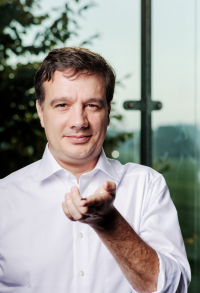
In 2013, Instituto Pedro Nunes (IPN), ESA Space Solutions Centre in Portugal identified Deimos Engenharia’s GNSS receiver as having exciting potential applications on Earth. Developed specifically for the Galileo GNSS system, it relies on radio signals to better determine a user’s position and time. As a result, the technology was shared across the ESA Technology Broker Network in 16 countries.
Deimos Engenharia had been studying potential applications of this technology, including in unmanned aerial vehicles, for some time. “We wanted to make the most of the unique features of the Galileo system, which is why we decided to develop our own receiver. We needed to master the receiver technology and have full control at its deepest level to develop the product and integrate it in advanced navigation solutions,” remarks Deimos Engenharia Director Nuno Ávila.
Around the same time, Brimatech, an ESA Technology Broker in Austrian, met an entrepreneur searching for high precision satellite-based positioning sensors for autonomous driving.
“Within three weeks of meeting Accurision’s CEO Gunnar Fleisch at a conference, we had eight technology suggestions for him, pre-checked by our ESA network partners. That was impressive!” remembers Brimatech’s Andrea Kurz.
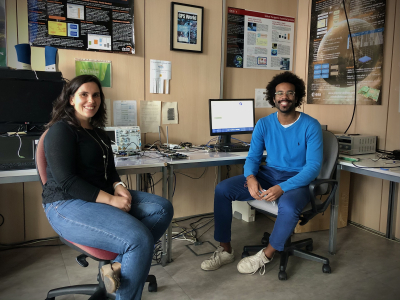
From the proposed space technologies offered, it was the Portuguese GNSS receiver from Deimos Engenharia that best suited the application. "Accurision's product approach is to be 'as robust as possible, as accurate as required'," mentions Gunnar Fleisch, Co-founder and CEO of Accurision.
Accurision is now using the Deimos solution to develop the GUIDANCE™ GNSS Sensor ASIC for autonomous driving. This takes advantage of one of the world’s most advanced civil GNSS signal, Galileo E5 AltBOC, to provide unparalleled robustness while achieving the required precision in dynamic rural and urban environments necessary for autonomous driving. It also features an integrated ionospheric delay estimation engine (IDEE), integrated interference detection and a mitigation engine (IDME) to further improve overall performance.
Accurision’s key aims with the new sensor are robustness, integrity, accuracy and precision. GUIDANCE will be ready to support the upcoming Galileo E6 High Accuracy Service, which will be available free of charge from late this year.
Making this international cooperation happen involved considerable effort. IPN and Brimatech brokered the first meeting between the two parties and supported them to agree and sign a technology transfer agreement, enabling future downstream technical developments.
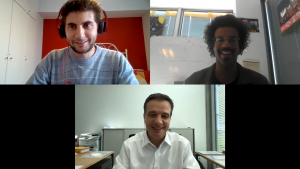
“Technology transfer is an elaborate activity,” explains Carlos Cerqueira, IPN’s Innovation Director. “Its cornerstone is the fit between technology and market requirements, but in the end what it takes is an excellent relationship with all parties, the ability to spot a need, find a matching offer and get the timing right. With Deimos, it was no different. It took time, but substantial economic impact is just about to happen.”
The partnership between Deimos Engenharia and Accurision teams is a clear example of the power of ESA’s ‘behind the scenes’ network and how a united European approach to space is fundamental to fostering the economies and societies through space technology. In future there will be autonomous vehicles relying on Galileo’s GNSS via the GUIDANCE™ GNSS Sensor ASIC, based on a patent jointly owned by the two companies for their Galileo Code Sensor – all thanks to the far-sightedness and hard work of ESA Space Solutions partners network. To further foster this technology transfer, Accurision received the support of the ESA Business Incubation Centre (ESA BIC) in Austria, where it was incubated. “It is our mission to support ground-breaking business ideas, building on existing European high-quality space capacity,” says Martin Mössler, Managing Director of Science Park Graz, General Manager of ESA BIC Austria.
ESA Space Solutions is the go-to-place for great business ideas involving space in all areas of society and economy. Our mission is to support entrepreneurs in Europe in the development of business using satellite applications and space technology to improve everyday life. Our programme is designed to provide multiple entry points such as ESA Business Incubation Centres (ESA BICs), ESA Technology Broker Network, and ESA Business Applications programme. Funding typically ranges from 50KEuro to 2MEuro and supports everything from space technology transfer, early stage incubation programs, Feasibility Studies to large-scale Demonstration Projects.
December, 15 / 2020
ESA BIC Noordwijk was ESA’s first Business Incubation Centre. Established in 2003, the ESA BIC programme has helped over 120 start-ups in the Netherlands, and over 800 across Europe, to integrate the use of space technology into their businesses. The programme in the Netherlands has been managed by SBIC Noordwijk since 2011.
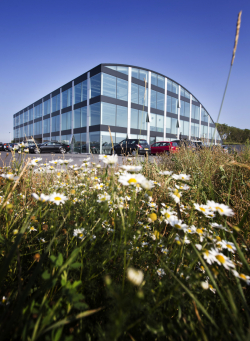
Matthew Edwards, Business Incubation Officer, ESA Space Solutions, said: “We are very pleased to extend our activities with ESA BIC Noordwijk. By 2026, over 150 space-related start-ups in the Netherlands will have received support through ESA BIC Noordwijk and its partners. This is a fantastic number for a relatively small country and demonstrates the value added to the local and national economy by such programmes.”
The extension of the contract will see SBIC Noordwijk managing the programme in the Netherlands for a minimum of 15 years in total.
“We are delighted with the trust and support we get from both the Netherlands Space Office and ESA to continue the all-round support for space-based businesses in the Netherlands,” declared Martijn Leinweber, COO of SBIC Noordwijk.
“With their help, we can maintain our reputation as the go-to place for start-ups and innovative companies, and be their guide in both the Dutch and international space communities.”
“With that in mind, our next steps will be to show the greater impact of space business in general, to inspire those seeking a career as an entrepreneur in the world of space, and to create an even stronger Dutch space start-up community.”
The ESA BIC programme is one of the many ways ESA and local space organisations (in this case, the Netherlands Space Office) have an impact on Earth. By creating businesses through technology transfer, by using an ESA patent, or working with any space-based technologies, such as Earth observation data or satellite navigation, numerous jobs – and an international network of innovative start-ups – have been, and continue to be created.
There are currently 21 ESA BICs in Europe, each managed by a country-specific third party to ensure local needs are met and local skills and experience are identified and fostered. For the Netherlands, SBIC Noordwijk offers businesses support for every stage of their entrepreneurial journey through business programmes, workshops and relevant events. Businesses incubated at ESA BIC Noordwijk benefit from its location on the Space Campus Noordwijk alongside ESA’s ESTEC R&D centre and many other key players from the space industry.
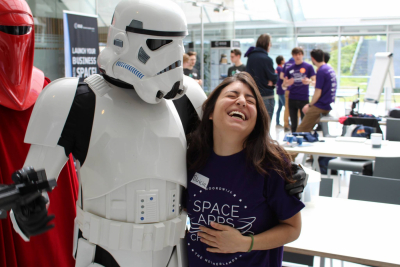
Niels Eldering, Section Head at ESA Space Solutions, said: “The ESA BIC programme has, through the years, successfully enabled many technology transfers. With the continuation of the programme in Noordwijk, we can once again demonstrate what’s possible when you combine the worlds of space and entrepreneurship. A lot of innovative power on Earth is space based, and we need the world to see that.”
"There's a massive potential in developing a wide array of new businesses with space technology and satellite data. The development of smallsats for IoT or Earth observation services for monitoring urban green areas are great recent examples of this. We have a lot of creative bright minds in our country who are able to develop new revenue models with this approach", says director of the Netherlands Space Office, Harm van de Wetering. "That's why we want to give start-ups with good ideas the opportunity to further develop their business plan."
ESA Space Solutions is the go-to-place for great business ideas involving space in all areas of society and economy. Our mission is to support entrepreneurs in Europe in the development of business using satellite applications and space technology to improve everyday life. Our programme is designed to provide multiple entry points such as ESA Business Incubation Centres (ESA BICs), ESA Technology Broker Network, and ESA Business Applications programme. Funding typically ranges from 50KEuro to 2MEuro and supports everything from space technology transfer, early stage incubation programs, Feasibility Studies to large-scale Demonstration Projects.
Robert-Bosch-Straße 7
64293 Darmstadt
Germany
Media Cube, IADT Dun Laoghaire, Kill Avenue.
Dun Laoghaire
Ireland